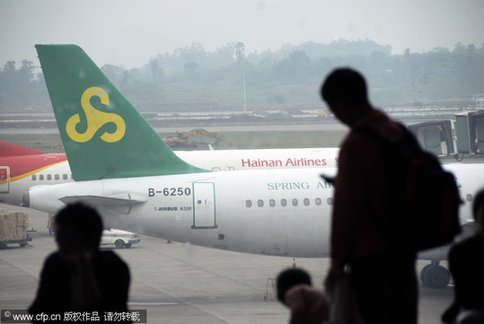Bumpy flight to recovery for Chinese airlines
China's aviation industry flew back into the black last year with aggregate net profit of 12.2 billion yuan on hefty fuel-hedging gains after the oil price more than doubled. That followed a record 28 billion yuan loss in 2008.
"The oil price isn't likely to grow significantly this year, and new mechanisms linking the jet fuel price with fuel surcharges will partly offset any climbing fuel costs for domestic carriers," Tao said.
Although the industry's prospects are looking up, it's not all blue skies ahead for the industry. One of its more serious challenges lurks on the ground below.
The government said it plans to build 42 high-speed rail lines spanning 13,000 kilometers over the next three years. As bullet trains become more numerous, it may be harder for the airlines to get bums on seats.
A high-speed railway linking Guangzhou in southern China with Wuhan in the middle of the country started running in December, paring the trip to three hours from 10-and-a-half hours previously. That compares with a 90-minute air flight, excluding the time it takes to get to the airport, check in and wait at the gate.
The one-way fare by bullet train from Wuhan to Guangzhou ranges from 490 yuan to 780 yuan. Domestic carriers on that route have been forced to reduce ticket prices by as much as 80 percent to compete.
Guangzhou-based China Southern even increased flight frequencies linking the two destinations to try to forestall a loss of air passengers.
"Big cities such as Beijing, Shanghai and Guangzhou are key hubs in the high-speed railway network as well as key markets in the aviation industry," said Zou Jianjun, a professor at Civil Aviation Management Institute of China.
 0
0 







